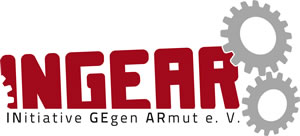
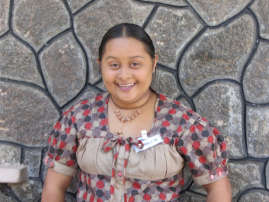 The long “wrong way to school” has finally come to an end for 15-talkative Sandani Mandira Gamage. Since February 2012 she has been called the nun the "Class of Hope". Affected rights they attend the mainstream school, but also their own rights, which they have not received, they are taken to a special school. But the special school in Sri Lanka is only responsible for the pupils. Sandani is a very happy girl. Her great passions are dancing and singing. So they dream of becoming a certain singer one day. In the “Class of Hope”, however, there will not only be their musical talent, even if they regulate, write and read purchased and practical things such as cooking, shopping and traveling by bus. Sandani heard one day make a living from her parents. Her big dream is to be able to hear herself. Maybe singing and dancing can be a little extra income for her one day ...
The long “wrong way to school” has finally come to an end for 15-talkative Sandani Mandira Gamage. Since February 2012 she has been called the nun the "Class of Hope". Affected rights they attend the mainstream school, but also their own rights, which they have not received, they are taken to a special school. But the special school in Sri Lanka is only responsible for the pupils. Sandani is a very happy girl. Her great passions are dancing and singing. So they dream of becoming a certain singer one day. In the “Class of Hope”, however, there will not only be their musical talent, even if they regulate, write and read purchased and practical things such as cooking, shopping and traveling by bus. Sandani heard one day make a living from her parents. Her big dream is to be able to hear herself. Maybe singing and dancing can be a little extra income for her one day ...
Establishment of the (after) school facility Class of Hope in 2011.
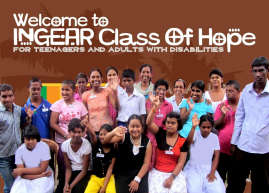 The “Class of Hope” project was launched in 2011 by Christoph Schmidtke, one of the board members of INGEAR, together with Dhammika de Silva, a teacher from Sri Lanka who is now the director and manager on site. Christoph was personally involved in setting up the project in Sri Lanka. There has been contact with the teacher couple Dhammika and Premadasa since 2007. Since October 2011, lessons have been taking place in the "Class of Hope".
The “Class of Hope” project was launched in 2011 by Christoph Schmidtke, one of the board members of INGEAR, together with Dhammika de Silva, a teacher from Sri Lanka who is now the director and manager on site. Christoph was personally involved in setting up the project in Sri Lanka. There has been contact with the teacher couple Dhammika and Premadasa since 2007. Since October 2011, lessons have been taking place in the "Class of Hope".
Inadequate preparation of people with disabilities for life as adults.
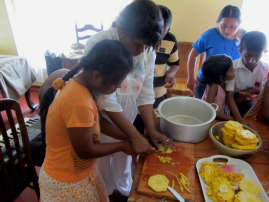 People with disabilities are looked down on in Sri Lanka and sometimes even despised. Although there are a few special schools for children and young people with disabilities in Sri Lanka, there are no after-school facilities. However, the Sri Lankan Ministry of Education obliges the special schools to prepare for the intermediate level of education. Many children with disabilities cannot meet these high requirements and therefore often do not receive a recognized qualification. In addition, it is often not even possible for them to master the hurdles of everyday life on their own. There are no school or post-school facilities that would train this - this is where the “Class of Hope” comes in: A practical school that is primarily intended to enable young people, but also adult people with disabilities, to take care of themselves Mastering everyday life and taking up a job.
People with disabilities are looked down on in Sri Lanka and sometimes even despised. Although there are a few special schools for children and young people with disabilities in Sri Lanka, there are no after-school facilities. However, the Sri Lankan Ministry of Education obliges the special schools to prepare for the intermediate level of education. Many children with disabilities cannot meet these high requirements and therefore often do not receive a recognized qualification. In addition, it is often not even possible for them to master the hurdles of everyday life on their own. There are no school or post-school facilities that would train this - this is where the “Class of Hope” comes in: A practical school that is primarily intended to enable young people, but also adult people with disabilities, to take care of themselves Mastering everyday life and taking up a job.
The students and teaching content of the “Class of Hope
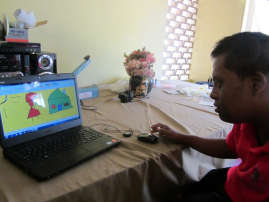 At present, 24 students between the ages of 16 and 34 attend the Class of Hope. The lessons are determined by (life-) practical contents and are conducted by five female teachers and one male teacher. The curriculum includes gardening, handicrafts (sewing, woodwork), art, computer lessons, Shinghalese, mathematics, hygiene training and cooking. At times, students are divided into two groups according to personal interests and strengths.
At present, 24 students between the ages of 16 and 34 attend the Class of Hope. The lessons are determined by (life-) practical contents and are conducted by five female teachers and one male teacher. The curriculum includes gardening, handicrafts (sewing, woodwork), art, computer lessons, Shinghalese, mathematics, hygiene training and cooking. At times, students are divided into two groups according to personal interests and strengths.
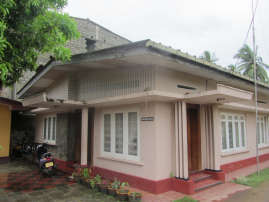 Among other things, the students learn to make small handcrafted items to earn extra money later on. These items, such as tablecloths, pillowcases, wicks for oil lamps, vases and hangers are later sold by the students in a small store, which is directly attached to the school. Self-grown vegetables, such as tomatoes, eggplants and chili peppers are also sold there. In this way, the students not only earn money for the school, but also learn how to deal with money and customers in an authentic situation. Fridays are always practice days. These are also referred to as "outing days". Here, the students usually leave the "protected space" of school and go, for example, shopping, to government offices, swimming, practice riding the bus, and much more.
Among other things, the students learn to make small handcrafted items to earn extra money later on. These items, such as tablecloths, pillowcases, wicks for oil lamps, vases and hangers are later sold by the students in a small store, which is directly attached to the school. Self-grown vegetables, such as tomatoes, eggplants and chili peppers are also sold there. In this way, the students not only earn money for the school, but also learn how to deal with money and customers in an authentic situation. Fridays are always practice days. These are also referred to as "outing days". Here, the students usually leave the "protected space" of school and go, for example, shopping, to government offices, swimming, practice riding the bus, and much more.
Initiation of integration and participation in social life
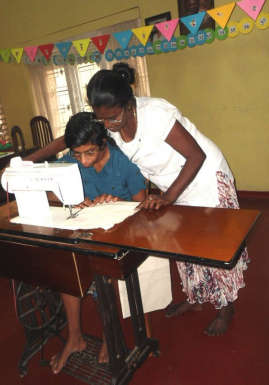 Integration and participation for people with disabilities are largely foreign words in Sri Lanka and have hardly taken place to date. Initiating this is the main objective of the project. The pupils should be enabled to lead an independent and self-determined life as adults in harmony with the public. In order to achieve this, practical life skills are promoted in particular. Because only those who find their way independently in traffic, can shop and deal with money, are able to take care of themselves and take part in social life. This also creates contacts and encounters between people with and without disabilities. A positive rethinking as well as a change of attitude can thus be initiated. In addition, the project is working in cooperation with INGEAR to be self-financing in the long term. INGEAR sees the support of the project as “helping people to help themselves”.
Integration and participation for people with disabilities are largely foreign words in Sri Lanka and have hardly taken place to date. Initiating this is the main objective of the project. The pupils should be enabled to lead an independent and self-determined life as adults in harmony with the public. In order to achieve this, practical life skills are promoted in particular. Because only those who find their way independently in traffic, can shop and deal with money, are able to take care of themselves and take part in social life. This also creates contacts and encounters between people with and without disabilities. A positive rethinking as well as a change of attitude can thus be initiated. In addition, the project is working in cooperation with INGEAR to be self-financing in the long term. INGEAR sees the support of the project as “helping people to help themselves”.
All expenses covered by INGEAR and advisory function
INGEAR finances the rent of the school building, as well as incidental expenses such as water and electricity. Furthermore, the teachers' salaries are paid and the travel costs of the students are also partially covered by INGEAR. This makes it possible for students from very poor families to attend classes on a regular basis. In order to be able to teach at all, basic equipment including; tables, chairs, teaching and learning materials such as paper, pens and scissors as well as a kitchen was necessary. In addition, a sewing machine for sewing lessons, a laptop for computer lessons and musical instruments such as drums, keyboard, etc. for music lessons were purchased on an one-time basis.
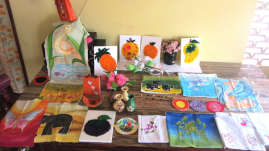 In the long term, the project is to be self-financed through sales of its own products, possibly offering various services, organizing concerts and exhibitions. INGEAR also advises the teachers on special education and organisational issues. Furthermore, INGEAR always sends volunteers to the project, These volunteers help on site and also partly use donations. This is very important for INGEAR, because the association's ideals of "transparency" and "direct contact" are taken into account in this way. Last but not least, the Class of Hope wants to support its students in realising their dreams of a self-determined, integrated life.
In the long term, the project is to be self-financed through sales of its own products, possibly offering various services, organizing concerts and exhibitions. INGEAR also advises the teachers on special education and organisational issues. Furthermore, INGEAR always sends volunteers to the project, These volunteers help on site and also partly use donations. This is very important for INGEAR, because the association's ideals of "transparency" and "direct contact" are taken into account in this way. Last but not least, the Class of Hope wants to support its students in realising their dreams of a self-determined, integrated life.
